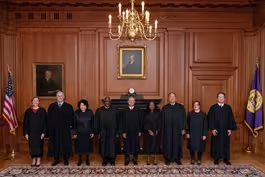
Mifepristone ruling is latest move to curb abortion access
Clip: 4/8/2023 | 6m 32sVideo has Closed Captions
Mifepristone ruling is latest in series of moves to curb abortion access
On Friday, a federal judge in Texas invalidated FDA approval of mifepristone, threatening access to the most common abortion pill in the country. Earlier this week, legislatures in Idaho, Kansas and Florida moved to further restrict abortion access in those states. Sarah Varney, senior correspondent for Kaiser Health News, joins Ali Rogin to discuss the latest developments.
Problems playing video? | Closed Captioning Feedback
Problems playing video? | Closed Captioning Feedback
Major corporate funding for the PBS News Hour is provided by BDO, BNSF, Consumer Cellular, American Cruise Lines, and Raymond James. Funding for the PBS NewsHour Weekend is provided by...

Mifepristone ruling is latest move to curb abortion access
Clip: 4/8/2023 | 6m 32sVideo has Closed Captions
On Friday, a federal judge in Texas invalidated FDA approval of mifepristone, threatening access to the most common abortion pill in the country. Earlier this week, legislatures in Idaho, Kansas and Florida moved to further restrict abortion access in those states. Sarah Varney, senior correspondent for Kaiser Health News, joins Ali Rogin to discuss the latest developments.
Problems playing video? | Closed Captioning Feedback
How to Watch PBS News Hour
PBS News Hour is available to stream on pbs.org and the free PBS App, available on iPhone, Apple TV, Android TV, Android smartphones, Amazon Fire TV, Amazon Fire Tablet, Roku, Samsung Smart TV, and Vizio.
Providing Support for PBS.org
Learn Moreabout PBS online sponsorshipWILLIAM BRANGHAM: Since the overturning of Roe v. Wade last summer, anti-abortion activists have tried numerous other strategies to curtail access to abortions.
As we reported a federal judge in Texas last night invalidated FDA approval of the most common abortion pill.
And earlier this week legislatures in Idaho, Kansas and Florida moved to further restrict abortion access in those states.
Earlier today, Ali Rogin spoke with our colleague Sarah Varney of Kaiser Health News, who has been tracking all these latest developments.
ALI ROGIN: Sarah, thank you for joining us.
As we mentioned last night, two federal judges reached very different conclusions about a widely used abortion medication mifepristone, walk us through where things stand now and what it means for people to access to this drug?
SARAH VARNEY, Kaiser Health News: Well, as of today, nothing will change.
We have two conflicting decisions, as you mentioned, we have one from Texas from Judge Kacsmaryk, he's a Trump appointed federal judge who essentially said that the FDA needed to revoke approval from mifepristone.
He gave the FDA seven days in order to appeal the decision or put it into effect.
This would mean that mifepristone, if it were to go into effect would come off the market across the country.
So even in states where abortion is legal, like Massachusetts, or California and New York, the other decision came from Washington State.
And this was actually a challenge brought by Democratic attorneys general essentially saying that mifepristone was in fact over regulated.
And the judge there in Washington state, a federal judge said that he didn't necessarily agree with the Attorney General's that it was over restrictive, but he did say the FDA had to continue to provide mifepristone at the status quo in those states in which the attorneys general represented.
ALI ROGIN: So you've read through Judge Kacsmaryk's decision, what stood out about it to you?
SARAH VARNEY: Well, we know a lot about Judge Kacsmaryk's background.
He was actually an anti-abortion movement lawyer before he was appointed to the bench.
And I think what's interesting about this decision is you really see that it's steeped in really what can only be called Christian extremism.
We have a couple of graphics to show you what is in that decision.
The first one talks about how mifepristone is the synthetic steroid that blocks the hormone progesterone, which is true, but he goes on to say that it ultimately starves the unborn human until death.
And because mifepristone alone will not always complete the abortion, the FDA mandates this two-step drug regimen which is true.
Mifepristone, "to kill the unborn human, followed by misoprostol to induce cramping and contractions to expel the unborn human from the mother's womb."
There is many things that are scientifically incorrect in this statement.
As I mentioned, mifepristone is used up until about 10 weeks of pregnancy.
So this is when the pregnancy is very, very small, it is just medically impossible for a person to see what even could resemble a fetus during a mifepristone type of abortion.
And then this assertion that women experience shame and regret or suicidal thoughts, you know, these are things that have not been proven to be true.
I think there's really no other way to sort of interpret this decision other than Judge Kacsmaryk's assertion for what has long been a goal of the pro-life movement, which is fetal personhood.
So this is the idea that a fetus is a person from the very moment of conception, and that there should be no intervention that God decides when a when a fetus comes into existence.
And at the other end of life when a human -- when a human dies, so there should be no intervention on that end as well.
ALI ROGIN: So yesterday's ruling on mifepristone is about FDA approval, but we should note that this is not a new drug that was recently approved by the FDA?
SARAH VARNEY: That's correct.
This drug was approved in 2000 by the FDA.
And we actually have a -- also a quote from Judge Rice's decision where he specifically talks about the scientific evidence on safety and efficacy of mifepristone.
He says, the plaintiffs assert that the FDA acknowledges that serious events are exceedingly rare that mifepristone associated fatality rate is very low, with not a single death casually attributed to mifepristone and that all the data shows the mifepristone is among the safest drugs in the world.
There is no reason scientific basis for subjecting it to additional burdens that are not applied to other riskier medications.
It's a drug that's safer than Viagra.
It's safer than Tylenol.
It's safer than penicillin.
This is a drug that's been very, very well studied.
ALI ROGIN: And there are several steps that are going to happen between now and any final decisions on this issue but if we play this out, what would happen to a person's access to abortions, if indeed mifepristone is restricted?
SARAH VARNEY: So as we mentioned, medication abortion is a two-step regimen.
The first pill is mifepristone, which halts the pregnancy and then misoprostol which causes cramping, and expulsion of the pregnancy tissue similar to a miscarriage.
So what clinics are doing is they are developing protocols for misoprostol only abortions.
There's more nausea, more bleeding, but it is still a quite safe way to terminate an early pregnancy.
ALI ROGIN: And Sarah, we saw a number of measures related to restricting abortion access around the country this week.
But let's talk about more broadly, what is the overarching strategy going on here that anti-abortion rights activists are pursuing?
SARAH VARNEY: As you mentioned, we saw in Idaho we -- there's now a travel ban that's going into effect in 30 days, that will make it a crime to help an unemancipated girl that's the language of the governor in Idaho from leaving the state for an abortion.
We're seeing other types of, you know, restrictions on certain types of medical procedures in places like Kansas, where abortion actually remains legal, because the voters resoundingly rejected a constitutional amendment that would restrict abortion.
We're seeing in Florida, a move to bring the ban from 15 weeks to six weeks.
So these legislatures have been very, very busy.
So we see activity both in the state but then obviously, with these two court rulings this week, you see that there's also a lot of activity in the federal justice system as well.
ALI ROGIN: Sarah Varney with Kaiser Health News, thank you so much.
SARAH VARNEY: Oh, it's my pleasure.
California’s reservoirs refill after historic winter storms
Video has Closed Captions
Clip: 4/8/2023 | 5m 16s | California’s reservoirs refill after historic storms, but snowmelt poses risks (5m 16s)
The consequences of the Supreme Court’s conservative shift
Video has Closed Captions
Clip: 4/8/2023 | 8m 16s | The history and future consequences of the Supreme Court’s conservative shift (8m 16s)
Providing Support for PBS.org
Learn Moreabout PBS online sponsorship
- News and Public Affairs

FRONTLINE is investigative journalism that questions, explains and changes our world.

- News and Public Affairs

Amanpour and Company features conversations with leaders and decision makers.












Support for PBS provided by:
Major corporate funding for the PBS News Hour is provided by BDO, BNSF, Consumer Cellular, American Cruise Lines, and Raymond James. Funding for the PBS NewsHour Weekend is provided by...

